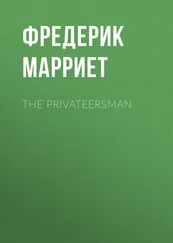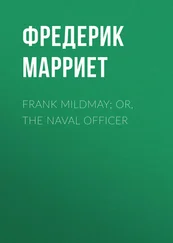Фредерик Марриет - The Pirate
Здесь есть возможность читать онлайн «Фредерик Марриет - The Pirate» — ознакомительный отрывок электронной книги совершенно бесплатно, а после прочтения отрывка купить полную версию. В некоторых случаях можно слушать аудио, скачать через торрент в формате fb2 и присутствует краткое содержание. Жанр: foreign_prose, literature_19, foreign_antique, на английском языке. Описание произведения, (предисловие) а так же отзывы посетителей доступны на портале библиотеки ЛибКат.
- Название:The Pirate
- Автор:
- Жанр:
- Год:неизвестен
- ISBN:нет данных
- Рейтинг книги:3 / 5. Голосов: 1
-
Избранное:Добавить в избранное
- Отзывы:
-
Ваша оценка:
- 60
- 1
- 2
- 3
- 4
- 5
The Pirate: краткое содержание, описание и аннотация
Предлагаем к чтению аннотацию, описание, краткое содержание или предисловие (зависит от того, что написал сам автор книги «The Pirate»). Если вы не нашли необходимую информацию о книге — напишите в комментариях, мы постараемся отыскать её.
The Pirate — читать онлайн ознакомительный отрывок
Ниже представлен текст книги, разбитый по страницам. Система сохранения места последней прочитанной страницы, позволяет с удобством читать онлайн бесплатно книгу «The Pirate», без необходимости каждый раз заново искать на чём Вы остановились. Поставьте закладку, и сможете в любой момент перейти на страницу, на которой закончили чтение.
Интервал:
Закладка:
As Mr Witherington senior had always studied comfort, his son had early imbibed the same idea, and carried his feelings, in that respect, to a much greater excess; he divided things into comfortable and uncomfortable. One fine day, Lady Mary Witherington, after paying all the household bills, paid the debt of Nature; that is, she died: her husband paid the undertaker’s bill, so it is to be presumed that she was buried.
Mr Witherington senior shortly afterwards had a stroke of apoplexy, which knocked him down. Death, who has no feelings of honour, struck him when down. And Mr Witherington, after having laid a few days in bed, was by a second stroke laid in the same vault as Lady Mary Witherington: and Mr Witherington junior (our Mr Witherington) after deducting 40,000 pounds for his sister’s fortune, found himself in possession of a clear 8,000 pounds per annum, and an excellent house in Finsbury Square. Mr Witherington considered this a comfortable income, and he therefore retired altogether from business.
During the lifetime of his parents he had been witness to one or two matrimonial scenes, which had induced him to put down matrimony as one of the things not comfortable: therefore he remained a bachelor.
His sister Moggy also remained unmarried; but whether it was from a very unprepossessing squint which deterred suitors, or from the same dislike to matrimony as her brother had imbibed, it is not in our power to say. Mr Witherington was three years younger than his sister; and although he had for some time worn a wig, it was only because he considered it more comfortable. Mr Witherington’s whole character might be summed up in two words—eccentricity and benevolence: eccentric he certainly was, as most bachelors usually are. Man is but a rough pebble without the attrition received from contact with the gentler sex: it is wonderful how the ladies pumice a man down to a smoothness which occasions him to roll over and over with the rest of his species, jostling but not wounding his neighbours, as the waves of circumstances bring him into collision with them.
Mr Witherington roused himself from his deep reverie, and felt for the string connected with the bell-pull, which it was the butler’s duty invariably to attach to the arm of his master’s chair previous to his last exit from the dining-room; for, as Mr Witherington very truly observed, it was very uncomfortable to be obliged to get up and ring the bell: indeed, more than once Mr Witherington had calculated the advantages and disadvantages of having a daughter about eight years old who could ring bells, air the newspapers, and cut the leaves of a new novel.
When, however, he called to mind that she could not always remain at that precise age, he decided that the balance of comfort was against it.
Mr Witherington, having pulled the bell again, fell into a brown study.
Mr Jonathan, the butler, made his appearance; but observing that his master was occupied, he immediately stopped at the door, erect, motionless, and with a face as melancholy as if he was performing mute at the porch of some departed peer of the realm; for it is an understood thing, that the greater the rank of the defunct the longer must be the face, and, of course, the better must be the pay.
Now, as Mr Witherington is still in profound thought, and Mr Jonathan will stand as long as a hackney-coach horse, we will just leave them as they are, while we introduce the brief history of the latter to our readers. Jonathan Trapp has served as foot boy , which term, we believe, is derived from those who are in that humble capacity receiving a quantum suff. of the application of the feet of those above them to increase the energy of their service; then as foot man ; which implies that they have been promoted to the more agreeable right of administering instead of receiving the above dishonourable applications; and lastly, for promotion could go no higher in the family, he had been raised to the dignity of butler in the service of Mr Witherington senior. Jonathan then fell in love, for butlers are guilty of indiscretions as well as their masters: neither he nor his fair flame, who was a lady’s maid in another family, notwithstanding that they had witnessed the consequences of this error in others, would take warning; they gave warning, and they married.
Like most butlers and ladies’ maids who pair off, they set up a public-house; and it is but justice to the lady’s maid to say, that she would have preferred an eating-house, but was overruled by Jonathan, who argued, that although people would drink when they were not dry, they never would eat unless they were hungry.
Now, although there was truth in the observation, this is certain, that business did not prosper: it has been surmised that Jonathan’s tall, lank, lean figure injured his custom, as people are but too much inclined to judge of the goodness of the ale by the rubicund face and rotundity of the landlord; and therefore inferred that there could be no good beer where mine host was the picture of famine. There certainly is much in appearances in this world; and it appears that, in consequence of Jonathan’s cadaverous appearance, he very soon appeared in the Gazette ; but what ruined Jonathan in one profession procured him immediate employment in another. An appraiser, upholsterer, and undertaker, who was called in to value the fixtures, fixed his eye upon Jonathan, and knowing the value of his peculiarly lugubrious appearance, and having a half-brother of equal height, offered him immediate employment as a mute. Jonathan soon forgot to mourn his own loss of a few hundreds in his new occupation of mourning the loss of thousands; and his erect, stiff, statue-like carriage, and long melancholy face, as he stood at the portals of those who had entered the portals of the next world, were but too often a sarcasm upon the grief of the inheritors. Even grief is worth nothing in this trafficking world unless it be paid for. Jonathan buried many, and at last buried his wife. So far all was well; but at last he buried his master, the undertaker, which was not quite so desirable. Although Jonathan wept not, yet did he express mute sorrow as he marshalled him to his long home, and drank to his memory in a pot of porter as he returned from the funeral, perched, with many others, like carrion crows on the top of the hearse.
And now Jonathan was thrown out of employment from a reason which most people would have thought the highest recommendation. Every undertaker refused to take him, because they could not match him. In this unfortunate dilemma, Jonathan thought of Mr Witherington junior; he had served and he had buried Mr Witherington his father, and Lady Mary his mother; he felt that he had strong claims for such variety of services, and he applied to the bachelor. Fortunately for Jonathan, Mr Witherington’s butler-incumbent was just about to commit the same folly as Jonathan had done before, and Jonathan was again installed, resolving in his own mind to lead his former life, and have nothing more to do with ladies’ maids. But from habit Jonathan still carried himself as a mute on all ordinary occasions—never indulging in an approximation to mirth, except when he perceived that his master was in high spirits, and then rather from a sense of duty than from any real hilarity of heart.
Jonathan was no mean scholar for his station in life, and during his service with the undertaker, he had acquired the English of all the Latin mottoes which are placed upon the hatchments; and these mottoes, when he considered them as apt, he was very apt to quote. We left Jonathan standing at the door; he had closed it, and the handle still remained in his hand. “Jonathan,” said Mr Witherington, after a long pause—“I wish to look at the last letter from New York, you will find it on my dressing-table.”
Читать дальшеИнтервал:
Закладка:
Похожие книги на «The Pirate»
Представляем Вашему вниманию похожие книги на «The Pirate» списком для выбора. Мы отобрали схожую по названию и смыслу литературу в надежде предоставить читателям больше вариантов отыскать новые, интересные, ещё непрочитанные произведения.
Обсуждение, отзывы о книге «The Pirate» и просто собственные мнения читателей. Оставьте ваши комментарии, напишите, что Вы думаете о произведении, его смысле или главных героях. Укажите что конкретно понравилось, а что нет, и почему Вы так считаете.












